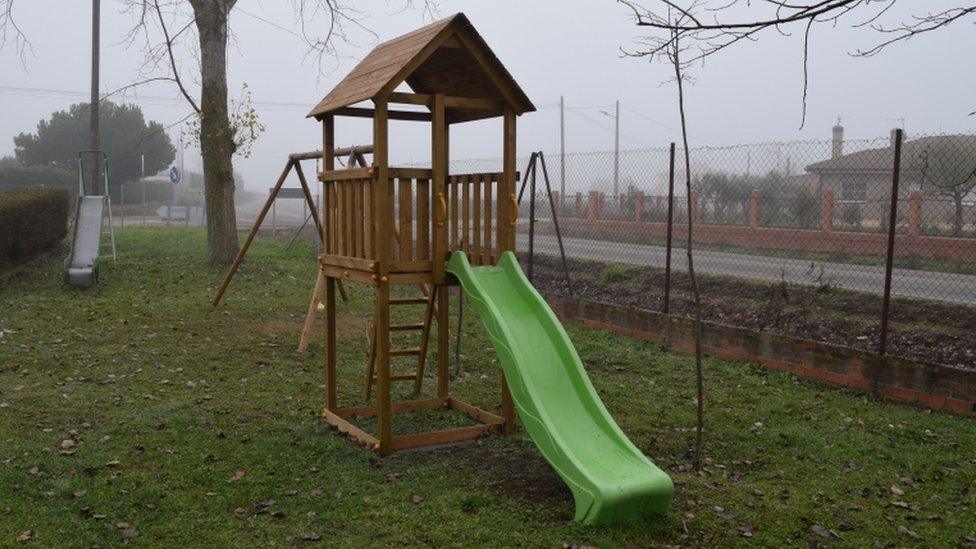Spanish political landscape set for new era
- Published
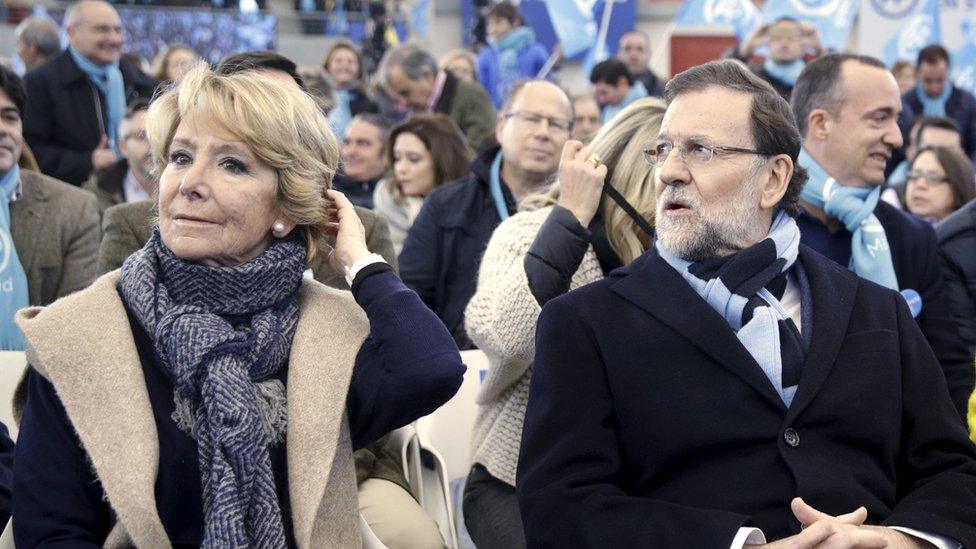
Ms Aguirre has told Prime Minister Mariano Rajoy he should apologise for party sleaze
A gift of cherries. Innocuous enough. Yet Spain's general election is no time for politicians to tempt fate.
So, as the cameras crowd around Esperanza Aguirre during a campaign walkabout, I notice that she doesn't pocket the cherries gifted to her by a grocer. Instead, she hands them out.
No-one can be bought for a handful of cherries, and Ms Aguirre - the Countess of Murillo and Bornos and a former cabinet minister - has been one of the most outspoken critics of what almost amounts to a culture of corruption in some parts of Spanish politics.
She, and fellow members of the Partido Popular (PP) which has been in office for the past five years, are frustrated that the government's signal achievement - stabilising the economy - is being undermined by the greed of some who were in the PP.
It was she who told the Prime Minister, Mariano Rajoy, that he should apologise for party sleaze.
Spanish election: Five things you need to know
The campaign route, through some of Madrid's most elegant streets, takes us into Margaret Thatcher Square.
Beaming at me, the elegant Ms Aguirre, who the British made an honorary dame, raises an arm towards the eponymous statue in the square, asking me whether Madrid is the only city to have given the former British prime minister such an honour.
New players
In one way, Spanish politics resembles the British politics of Mrs Thatcher's first couple of years in Downing Street: a conservative party and a socialist party, each containing many factions, but so dominant that other parties are only fringe players in a general election campaign.
The two big blocs, PP and its rival, PSOE, are the result of a historical compromise that followed the death of Gen Franco in 1975.
In effect, both fascists and communists drew a line under the divisions of the past.
Slowly, many of them were absorbed into these two big parties.
They've alternated power ever since, on occasion with smaller parties propping them up.
Yet this could be election that changes all that.

Vying for power in Spain
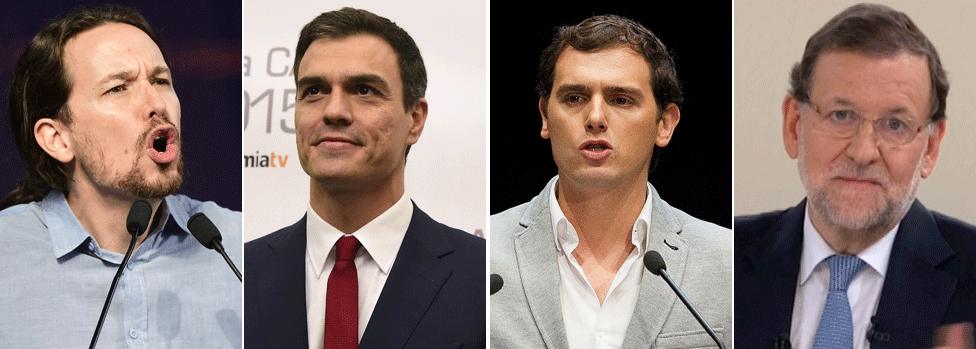
From L to R: Pablo Iglesias of Podemos, Socialist leader Pedro Sanchez, Albert Rivera of Ciudadanos (Citizens) and PP leader Mariano Rajoy
Podemos: Left-wing party founded in 2014 by university professor Pablo Iglesias
Spanish Socialist Workers' Party (PSOE): Centre-left party that has been in power alternately with PP since 1982
Ciudadanos (Citizens): Centrist party formed in Catalonia in 2006 opposing Catalan independence before going national in 2013
Partido Popular (People's Party, PP): Centre-right party of Prime Minister Mariano Rajoy, in power since December 2011

During the three days I spent on the campaign trail, politicians from both right and left, as well as the pundits, told me the same thing: economic collapse and corruption meant that neither of the big parties would win outright, and that the dramatic rise of two new political parties might mean they never would again.
One is Podemos, led by the charismatic Pablo Iglesias, a young academic who, when I was here for the last general election five years ago, was one of The World This Weekend's pundits. In the televised leaders debate last week, he stood out because of his ponytail and rolled-up sleeves.
Yet Podemos, a radical party that grew out of street protests by what were called "indignados" - some of the 50% of Spain's young people who are part of the workforce but don't have a job - may have peaked.
The naked politician
I saw the importance of the newest party, Ciudadanos (Citizens), on a visit to a western suburb, Pozuelo.
On a recent public holiday, its streets were so quiet, and the trees and neatly clipped hedges so extensive, the sounds of the city didn't penetrate.
On the front of the railway station, where its well-heeled commuters pass twice a day, is a poster showing a serious-looking young man.
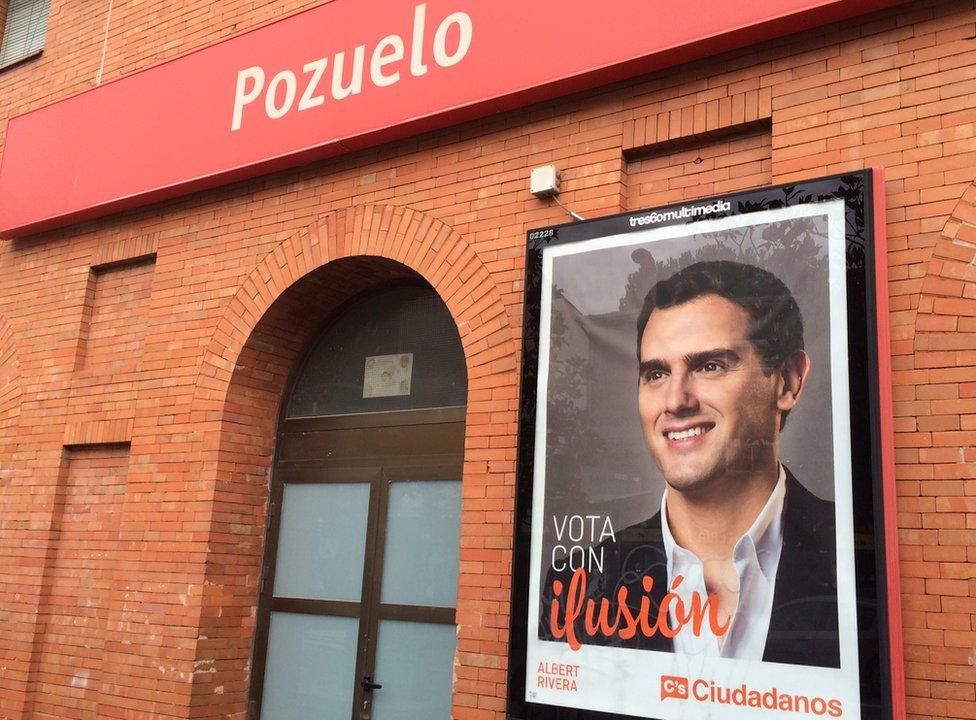
Albert Rivera's image greets commuters in Pozuelo
Just a few years ago, Albert Rivera posed naked to get attention, which, since he's a former champion swimmer, was probably no hardship. Today, though, Ciudadanos, the party he leads, is consistently polling 20%.
Not bad for what started as a party opposed to Catalan independence, one which only went national two years ago.
After chatting to some locals enjoying a holiday coffee in the unseasonably mild air, I sat down with Prof Luis Garicano. He's on sabbatical from the London School of Economics, campaigning with all the enthusiasm of the political newbie that he is.
Were Ciudadanos to win the election, he'd be finance minister. But surely, I said, as a new and smaller party than PP or PSOE, it could only expect to be a coalition partner?
Prof Garicano says Mr Rivera has been studying the fate of the Liberal Democrats in Britain (not surprising, perhaps, since the professor is friends with Nick Clegg and his wife, Miriam Gonzalez Durantez; they were all at the College of Europe together). "We will not go into any government that we are not running," he told me.
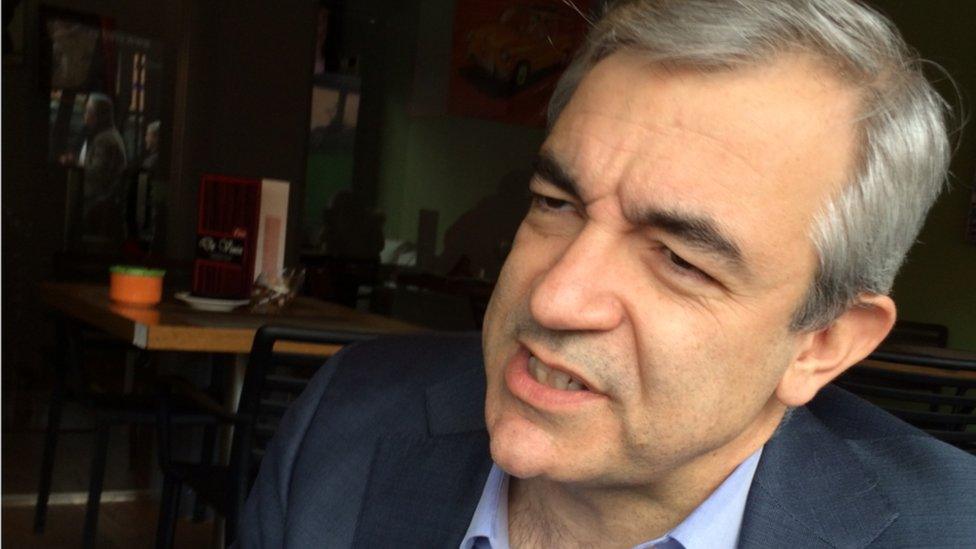
Luis Garicano would be finance minister if Ciudadanos were to win the election
The old two-party system, Prof Garicano said, was probably dead.
Construction and corruption
If so, one building that could be preserved as a monument to its destruction lies in Valdemoro, a small town about 27km south of Madrid.
High up, just above the park and with a splendid view over the town, is a large house, abandoned and unfinished.
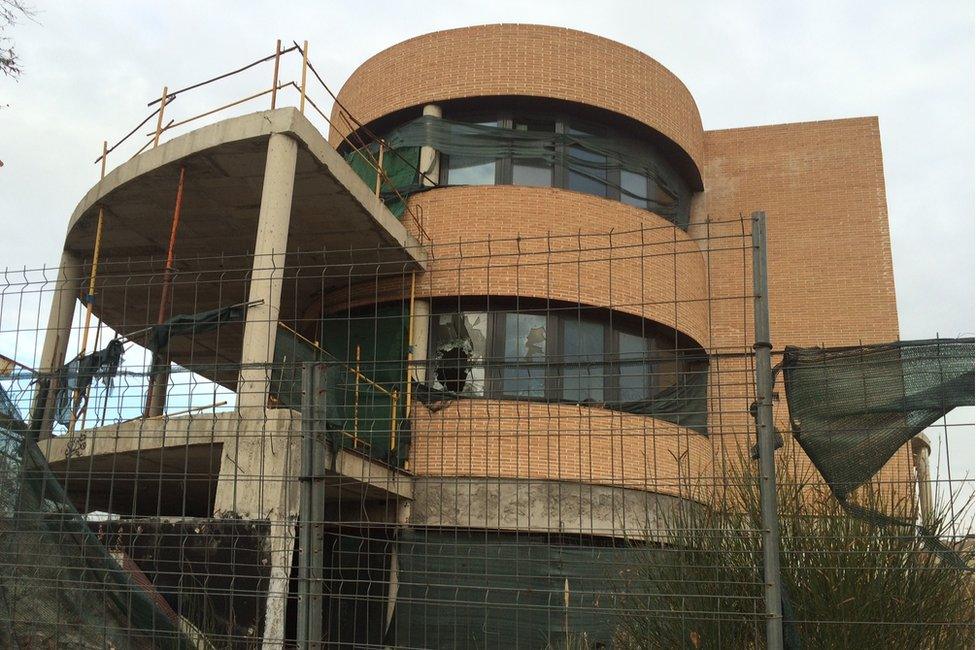
This abandoned property could have become a luxury home for Valdemoro's former mayor, who has since been jailed
That's hardly unusual in Spain. In fact, soaring property prices and the orgy of construction that followed was one of the factors that brought the Spanish economy crashing down.
In all, 2,000 mayors have been linked to claims of corruption, and much of that is to do with the award of planning permission and tenders for contracts.
Locals believe this would have become a luxury home for Francisco Granados.
Once the mayor here, he then became head of the PP's Madrid branch until 2011.
During that time, according to a High Court judge, he was "the core of the criminal organisation", one that resulted in a healthy balance in a Swiss bank account.
Prosecutors said he and David Marjaliza, who was in construction, had developed a bid-rigging scheme, with 250m euros (£180m) worth of public contracts awarded unlawfully in the previous two years.
Last year, the former PP grandee was jailed on preliminary charges of money laundering, criminal association, influence peddling, bribery, misappropriation of funds, abuse of power and fraud.
The building, with its tower, smashed windows and broken-down barbed-wire fence could be called "Granados's Folly" - except that it wasn't just PP politicians caught up in the scandal. There were socialists too.
'Alliance of losers'
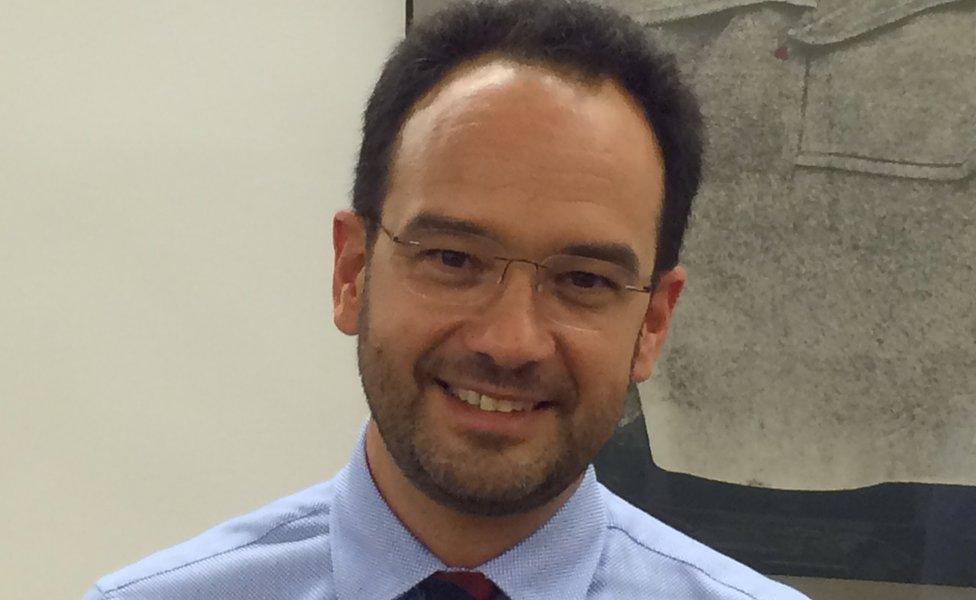
PSOE MP Antonio Hernando admits Spain is entering unknown territory
Despite that, Antonio Hernando, an MP and spokesman for PSOE, tells me the Socialists - evicted from office, having been in power when the economic crisis began - will emerge as the largest party, though he adds: "We're entering a period we've never known since Spain's transition to democracy."
That means making deals with Ciudadanos or Podemos.
Back in the spring, a similar sort of agreement prevented Ms Aguirre from becoming mayor, even though PP won the biggest share of the vote and the largest number of council seats.
When I asked her why she hadn't won, she fixed me with the sort of piercing look that seemed appropriate in Margaret Thatcher Square.
"I won the election, but an alliance of losers took power," she said.
After next Sunday, that could be the PP's national lament too.

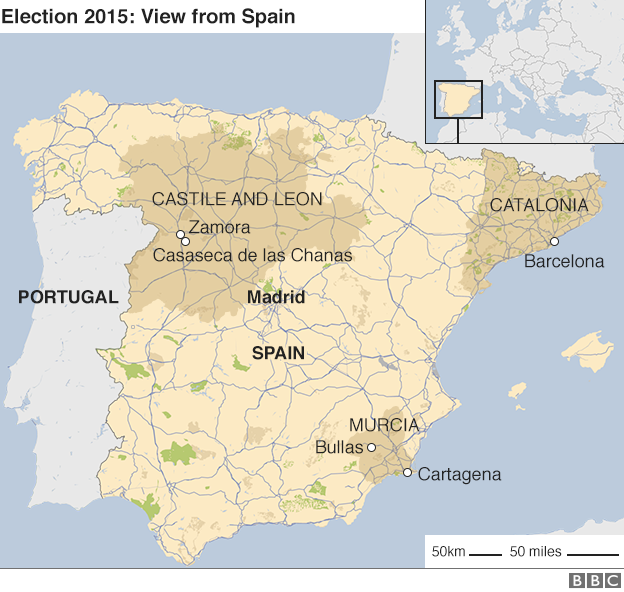
Housing row in Spain's election: Taking back Barcelona's apartments
Education in Murcia: Spain's voters call for shake-up in classroom
Spain's vanishing rural population in the North: Resisting change in a dying village

- Published15 December 2015
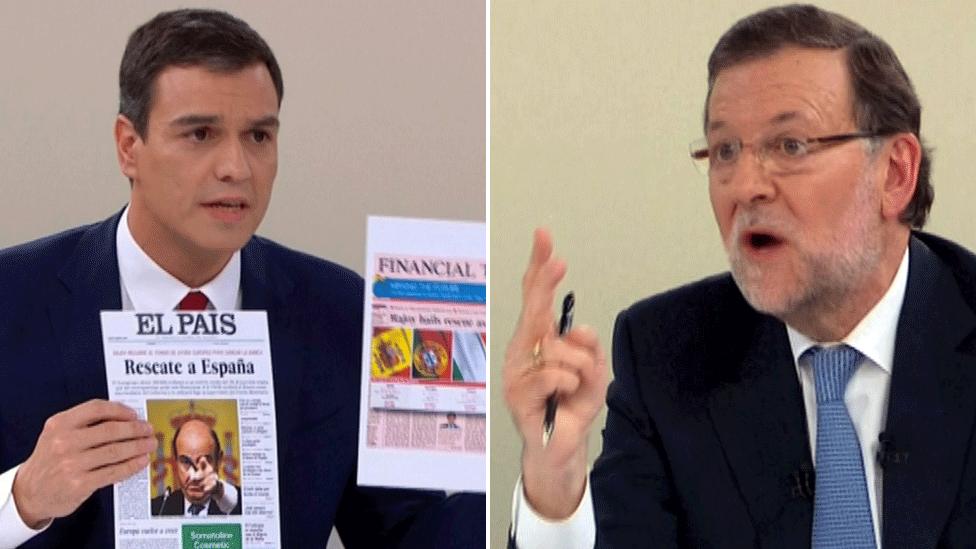
- Published4 December 2015
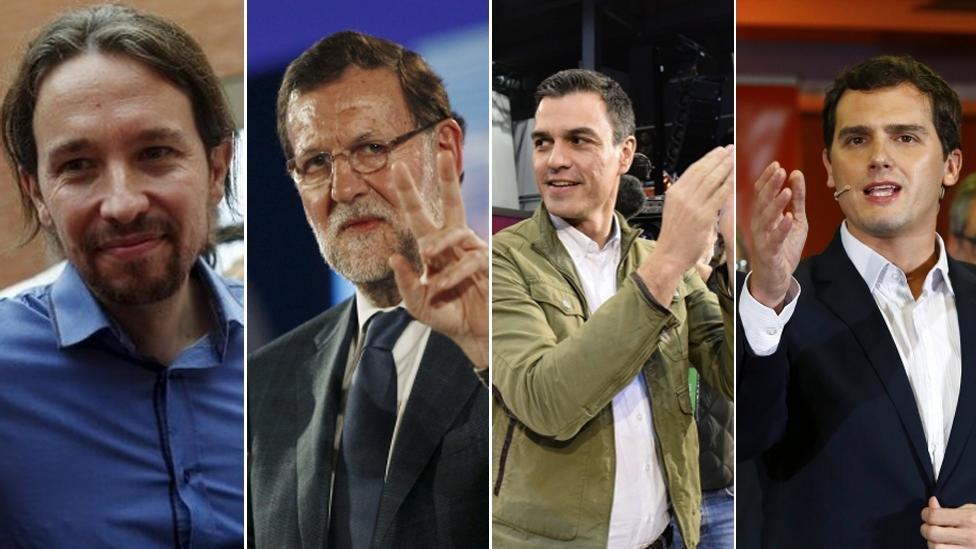
- Published12 December 2015
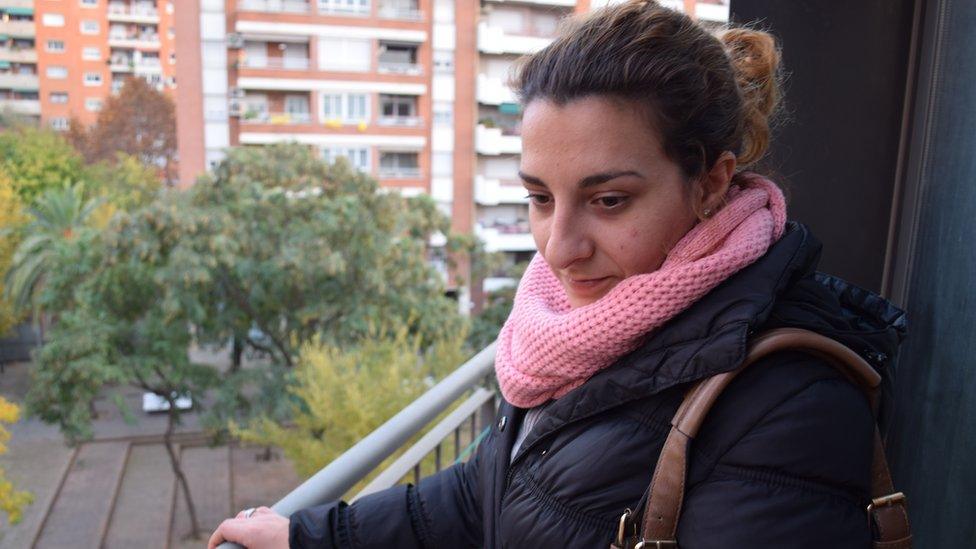
- Published8 December 2015
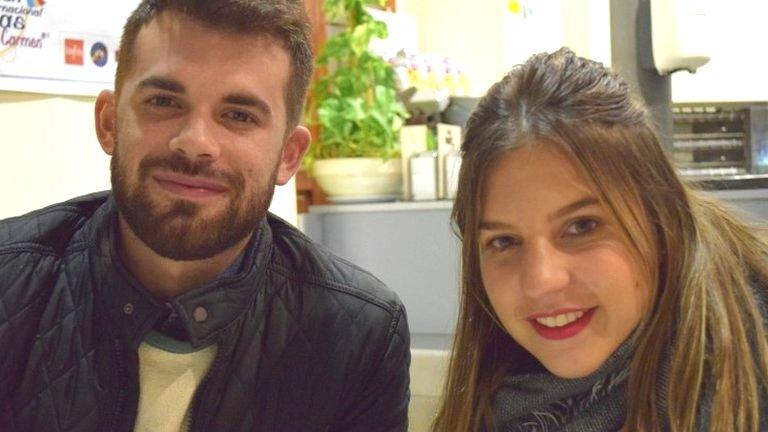
- Published10 December 2015
